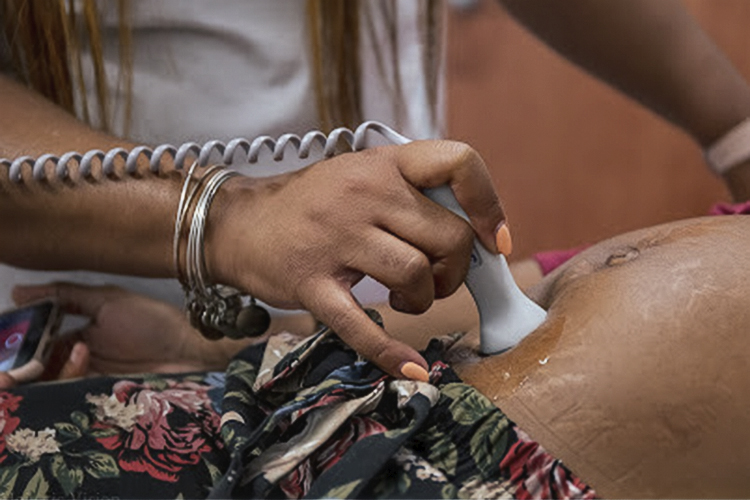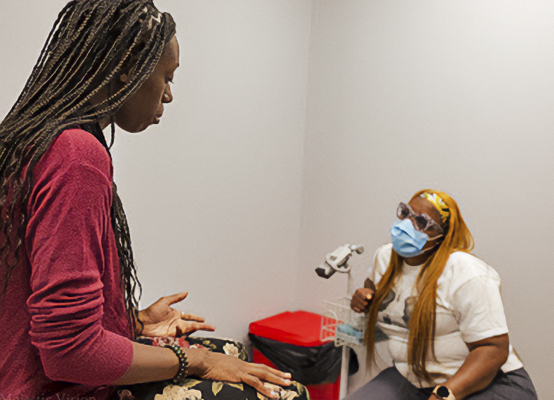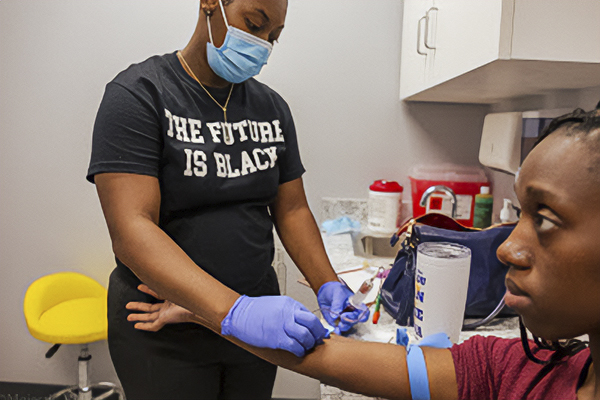Support network: Village of Healing wins $1 million grant to combat health inequities
In early June, Euclid-based Village of Healing Center, the first and only Black woman’s health center in Cuyahoga County, was one of five organizations to receive multi-year $1 million grants from the St. Luke’s Foundation to expand their services into the Buckeye-Shaker neighborhood.
In June, St. Luke’s Foundation awarded $5.9 million in grants to 15 organizations that support the mission to achieve health equity by addressing social determinants of health and the strengthen the neighborhoods surrounding the former Saint Luke’s hospital.
Black health professionals, Da’na M. Langford and Tenisha Gaines founded the Village of Healing in 2019 with two programs designed to repair the racial inequities in maternal and infant health outcomes in the Black community. It opened its Euclid facility in February 2022.
Cuyahoga County has one of the worst Black infant mortality rates in the country, and Cleveland ranks among the worst in the county. First Year Cleveland, a community organization created to address infant mortality, reports that of the 13,204 births in Cuyahoga County in 2020, 101 of those babies didn’t live until their first birthdays and 73% of those babies who died were Black from all socioeconomic levels.
Maternal death, while less common, is still worse in the Black community. In Ohio, Black women are 2.5 times more likely to die in childbirth than white women.
These disparities persist even when controlling for underlying social and economic factors, which is one of the reasons that the Village of Healing takes private insurance as well as Medicaid, self-pay, and membership options.
 The Village of Healing Center provides a network of Black health professionals to serve women in all their health needs'This is our story’
The Village of Healing Center provides a network of Black health professionals to serve women in all their health needs'This is our story’
This issue has been gaining national attention with the death of Olympic athlete Tori Bowie, and with Black celebrities like Allyson Felix, Serena Williams, and Beyonce sharing their traumatic childbirth experiences with the world.
The popular Hulu documentary Aftershock also drives home the devastating consequences of these inequities and gives emotional resonance to these statistics.
“This is our story; this is our life. We live it every single day,” says Village of Healing CEO and medical director Da’na M. Langford. “But we need to be asking … the hospital systems… the elected officials, what are they doing? What are you actually planning to do that’s going to change the policies to fare well for Black women so that we are allowed to thrive in this country like everyone else?”
Gaines and Langford aren’t waiting for an answer. Village of Healing uses a team-based approach to combat these health inequities. The nonprofit center provides a network of Black health professionals to serve women in all their health needs—especially through the often-dangerous time before, during, and after childbirth.
Even though the organization doesn’t have in-hospital privileges yet, Gaines and Langford work with the local doula organization, Birthing Beautiful Communities (BBC), to ensure that each patient has at least two Black professionals with eyes on them as they navigate the health system.
One patient, who had three preterm deliveries before she came to the Village of Healing, went full term in her fourth pregnancy and delivered a healthy baby with a BBC doula and Langford as her midwife.
 The Village of Healing Center’s programs are designed to repair the racial inequities in maternal and infant health outcomes in the Black communityThe village network also includes Our Wellness Network, Better Health Partnership, Neighborhood Leadership Institute, and Pregnant with Possibilities, among others.
The Village of Healing Center’s programs are designed to repair the racial inequities in maternal and infant health outcomes in the Black communityThe village network also includes Our Wellness Network, Better Health Partnership, Neighborhood Leadership Institute, and Pregnant with Possibilities, among others.
In the year since opening, the Village of Healing staff has doubled and served more than 650 women—with some patients coming from as far as Columbus for their prenatal care.
The St. Luke’s grant will allow Gaines and Langford to expand their reach and offer neighborhood services and provide health services for entire families.
“We are meeting the needs of our community,” says Langford. “We’re listening. We’re not only listening we’re hearing. My team continues to grow because I want patients to have a support staff that isn’t struggling. We have been blessed to be able to bring in the necessary personnel to function in a way that has been awesome and amazing.”
Discovering their calling
Langford was born in Cleveland and raised in South Euclid in a single-parent household (her dad was in prison for most of her childhood). She graduated from Beaumont School and Eastern Michigan University and acknowledges that her story could have gone a completely different way if it wasn’t for her supportive family.
Working at a women’s shelter after college, Langford discovered what she wanted to do with her life.
The Village of Healing Center works with doula organization, Birthing Beautiful Communities to ensure that each patient has at least two Black professionals with eyes on them as they navigate the health system“I wanted to make sure that I worked especially with Black families,” she recalls. “I wanted Black girls to be able to look at me, visualize themselves, and know it’s not always sweet, perfect, and laid out for you. Sometimes you got to do the work and work really hard to change the trajectory of your story and narrative.”
The woman’s shelter and a stint at Planned Parenthood introduced Langford to midwifery and she went to The Ohio State University to earn her master’s degree in nurse-midwifery and women’s health.
But it was a visit to the slave dungeons on a trip to Africa that truly set her on her current path. “I was walking out of the door that says, ‘point of no return,’” Lanford recalls. “It was in that moment that I felt my ancestors. I felt my ancestors have a conversation with me, to say that it was my responsibility to be a good ancestor in that they had essentially given life for me to be where I am. And I stand on their shoulders.”
Soon after that trip, Langford met Village of Healing co-founder and director of operations Gaines, began her career as a medical assistant and worked her way up through the healthcare field to eventually earn her MBA and a coaching certificate.
Together, the two women are making real and positive change, empowering Black women and growing their network to protect them.
“You hear this term, ‘I’m my ancestors’ wildest dreams.’” Langford says, talking about her female ancestors in the slave dungeons. “I don’t think that Black women could have ever imagined a Black girl and her Black business partner starting a business dedicated to saving the lives of black women and it be respected. I also know that I want to make sure that we’re good ancestors for those who follow us and that we put this fight forward.”



